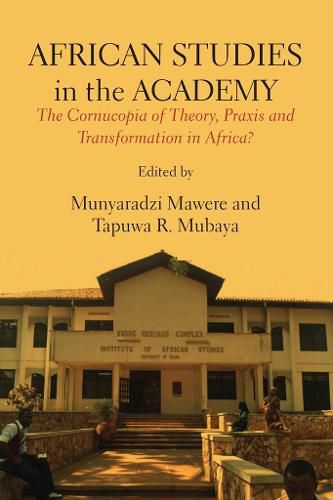Readings Newsletter
Become a Readings Member to make your shopping experience even easier.
Sign in or sign up for free!
You’re not far away from qualifying for FREE standard shipping within Australia
You’ve qualified for FREE standard shipping within Australia
The cart is loading…






This title is printed to order. This book may have been self-published. If so, we cannot guarantee the quality of the content. In the main most books will have gone through the editing process however some may not. We therefore suggest that you be aware of this before ordering this book. If in doubt check either the author or publisher’s details as we are unable to accept any returns unless they are faulty. Please contact us if you have any questions.
For a long time, African Studies as a discipline has been spearheaded by academics and institutions in the Global North. This puts African Studies on the continent at a crossroads of making choices on whether such a discipline can be legitimately accepted as an epistemological discipline seeking objectivity and truth about Africa and the African peoples or a discipline meant to perpetuate the North’s hegemonic socio-economic, political and epistemic control over Africa. The related question that immediately arises is: Who should produce what and which space should African Studies occupy in the academy both of the North and of the South?
Confronted by such a question, one wonders whether the existence of African Studies centres in the academies of the global, north opens opportunities for critical thinking on Africa, or if it opens possibilities for the emergence of the same discipline in Africa as a fertile space for trans-disciplinary debate. While approaches critical for the development of African Studies are pervasive in African universities through fields such as cultural studies, social anthropology, history, sociology, indigenous knowledge studies and African philosophy, the discipline of African Studies though critical to Africa is rarely practiced as such in the African academy and its future on the continent remains bleak. African Studies in the Academy is a testimony that if honestly and objectively practiced, the crossroads position of African Studies as a discipline makes it a fertile ground for generating and testing new approaches critical for researching and understanding Africa. It also challenges Africa to seriously consider assuming its legitimate position to champion African Studies from within. These issues are at the heart of the present volume.
$9.00 standard shipping within Australia
FREE standard shipping within Australia for orders over $100.00
Express & International shipping calculated at checkout
This title is printed to order. This book may have been self-published. If so, we cannot guarantee the quality of the content. In the main most books will have gone through the editing process however some may not. We therefore suggest that you be aware of this before ordering this book. If in doubt check either the author or publisher’s details as we are unable to accept any returns unless they are faulty. Please contact us if you have any questions.
For a long time, African Studies as a discipline has been spearheaded by academics and institutions in the Global North. This puts African Studies on the continent at a crossroads of making choices on whether such a discipline can be legitimately accepted as an epistemological discipline seeking objectivity and truth about Africa and the African peoples or a discipline meant to perpetuate the North’s hegemonic socio-economic, political and epistemic control over Africa. The related question that immediately arises is: Who should produce what and which space should African Studies occupy in the academy both of the North and of the South?
Confronted by such a question, one wonders whether the existence of African Studies centres in the academies of the global, north opens opportunities for critical thinking on Africa, or if it opens possibilities for the emergence of the same discipline in Africa as a fertile space for trans-disciplinary debate. While approaches critical for the development of African Studies are pervasive in African universities through fields such as cultural studies, social anthropology, history, sociology, indigenous knowledge studies and African philosophy, the discipline of African Studies though critical to Africa is rarely practiced as such in the African academy and its future on the continent remains bleak. African Studies in the Academy is a testimony that if honestly and objectively practiced, the crossroads position of African Studies as a discipline makes it a fertile ground for generating and testing new approaches critical for researching and understanding Africa. It also challenges Africa to seriously consider assuming its legitimate position to champion African Studies from within. These issues are at the heart of the present volume.